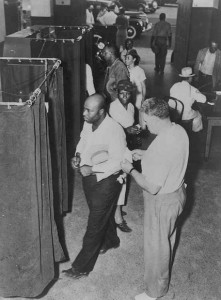The recent acquittal of George Zimmerman, on trial for the killing of African-American teenager Trayvon Martin, has reignited the debate over race in America led by passionate protests from the African-American community. Yet on top of the tragedy of Martin’s death, the outrage at the results of the Zimmerman trial stems from a seriously dangerous situation where African-Americans are not being adequately represented in our current government. When you consider the barriers placed on the average white voter in our crumbling election system you can start to get an idea of how the African-American community, particularly young males, are shut out of politics.

For all Americans, the election system is breaking down. We simply are not in general representing our people well in government. Fifty states have fifty different sets of byzantine, non-transparent laws. We currently lack universal ballot access, proper redistricting, any kind of third party access, and voter registration is for some reason preventing millions across the country from voting.
Corruption and the influence of money in elections has been basically legalized. As anyone can tell from talking politics with their neighbors, a large and increasing number of Americans consider the democracy over and done with. I don’t agree, but this view is quite common.
African-Americans meanwhile have to contend with added caveats to their voting rights. Voter suppression is the recent history of the United States characterized after slavery in the poll taxes and literacy tests of the racist Jim Crow era specifically designed to keep blacks from voting (it worked btw). Regrettably the tradition continues.
The Supreme Court has only weeks ago dismantled the Voting Rights Act that was designed to prevent such suppression of African-American voting and the court is on track to further weaken the remaining protections. This is only a year after the dismantled sections of the Voting Rights Act were used to reject Texas’ redistricting law for the sole reason that it had been designed to reduce the electoral power of minorities.
No matter the political affiliation of the court, the ruling as well as the repeated resurfacing of attempts to repress the minority vote, feed the view held by many African-Americans, of a system that is not designed to represent them.
Denial of Voting Rights
The so-called African-American “achievement gap” also contributes to a growing sense of detachment. According to the 2012 census, the median income of white families is $62,545 while it is only $38,409 for black families. According to a widely cited study “the Hispanic-White Achievement Gap in Math and Reading in the Elementary Grades,” the American Educational Research Journal reported that “evidence of the racial achievement gap has been manifested through standardized test scores, high school dropout rates, high school completion rates, college acceptance and retention rates, as well as through longitudinal trends.” The issue of incarceration of African-Americans is also a shocking blow to democracy. One out of six African-American males have been in our jails since 2001 making them ineligible to vote and African Americans are incarcerated at nearly six times the rate of whites.
The final question remains: are African-Americans being properly represented by our democracy? Campaigns for laws that are openly designed to reduce the minority vote are certain to continue following the dismantling of the Voting Rights Act. Amid the vast increase of money in elections, the economic burdens of the communal African-American history seem destined to continue feeding political detachment. If the era of voter suppression has indeed returned, we would expect to see the problems exacerbated in the future. But there is hope that on the side of a solution to these solvable problems are enough non-African-Americans willing to stand up for their brethren and the integrity of our democracy. We can do better.
Leave a Reply